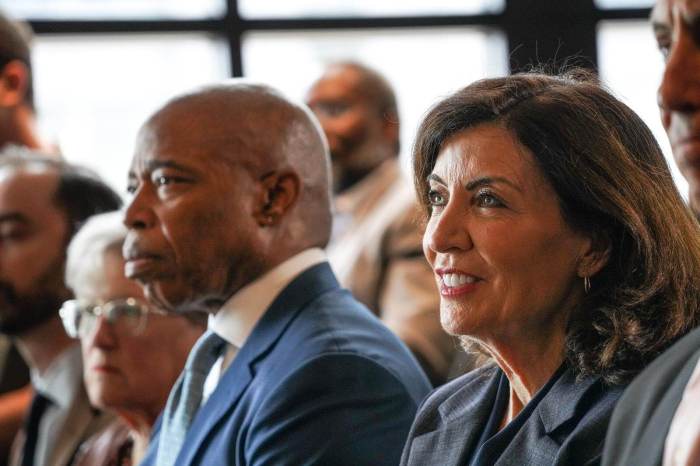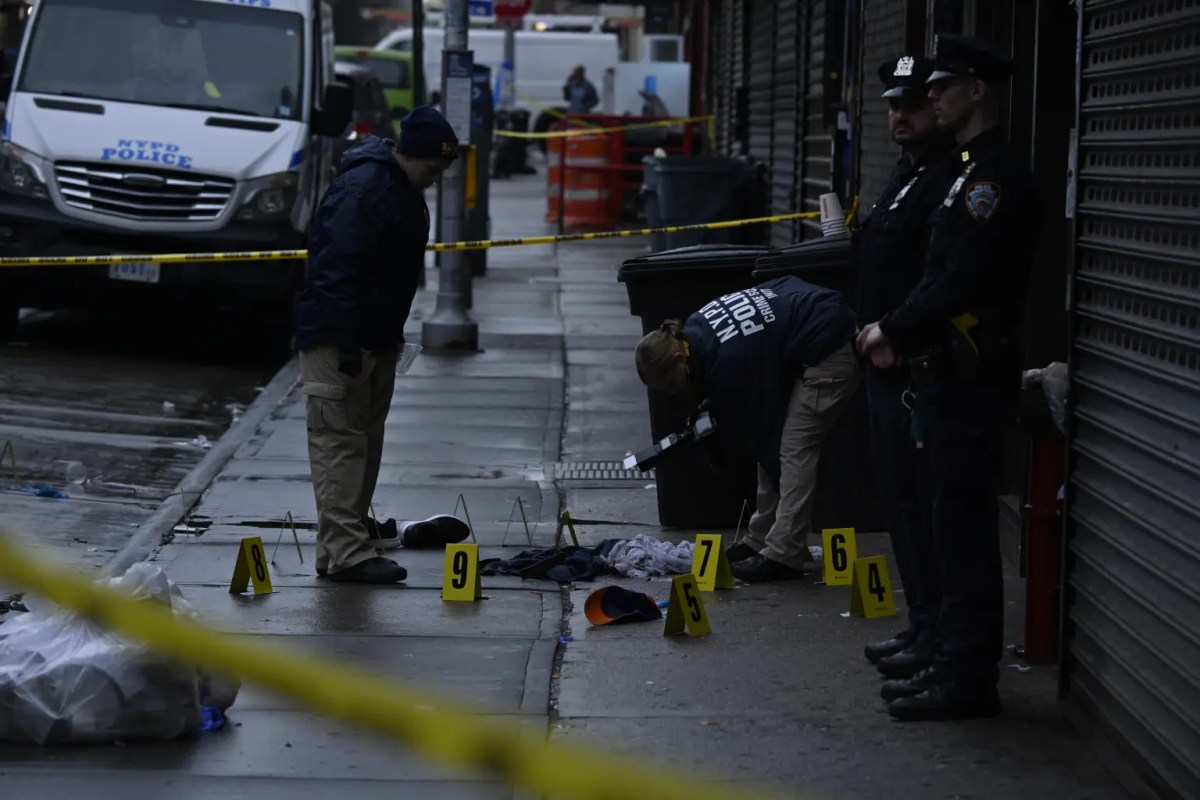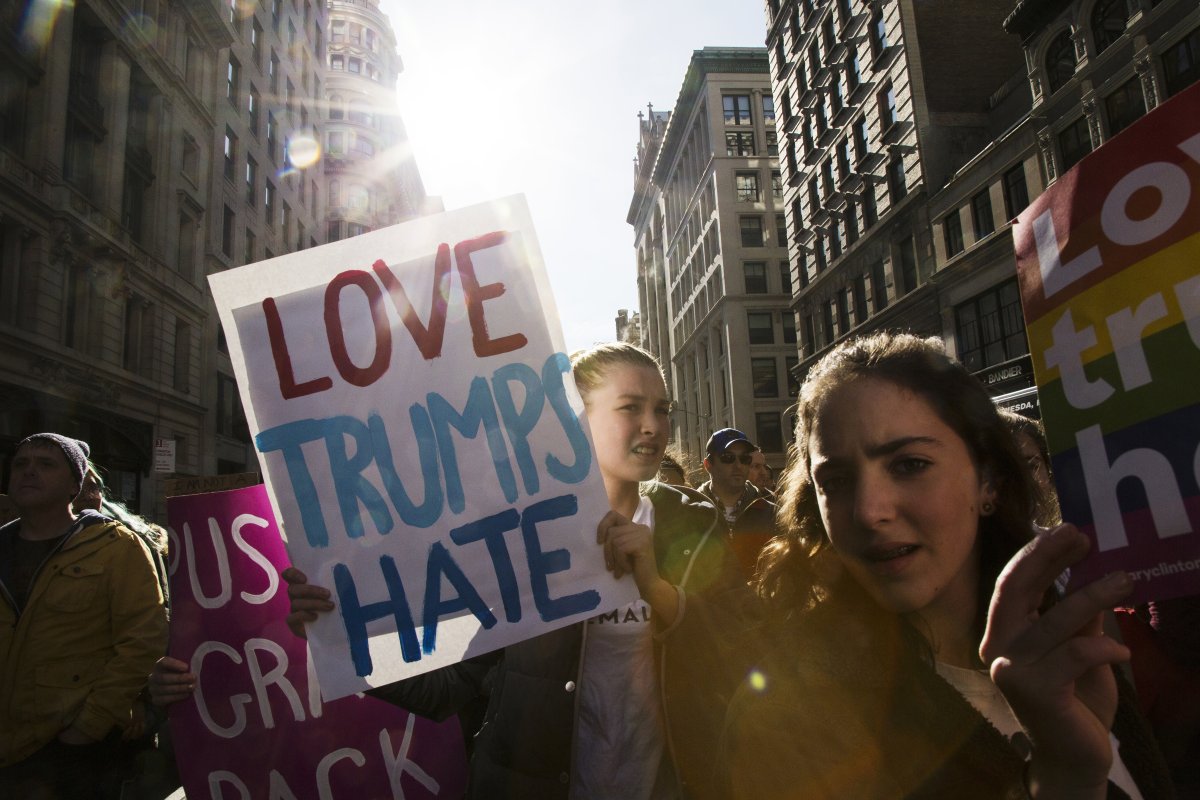
BY SARAH FERGUSON | A grassroots movement to unseat Donald Trump is coalescing, mobilizing protest numbers not seen since the start of the Iraq War. On Sat., Nov. 12, some 25,000 people marched on Trump Tower on Fifth Ave. to declare its owner “Not My President!” according to police estimates.
It was the fourth straight day of angry demonstrations in the president-elect’s hometown, with more rallies and strategy sessions for activists planned this week.
The alt-right media — and even some on the left — have been quick to cast the protests here and across the nation as the work of “professional” agitators hired by MoveOn.org and billionaire George Soros. But what’s significant is just how organic and broad-based the demonstrations in New York have been, reflecting a city where nearly 80 percent of the vote went for Clinton.
On Friday night, a rowdy crowd of thousands marched from Union Square to Trump Tower. The protest, which was initially called by the left-wing group Socialist Alternative, brought Hillary voters chanting alongside Jill Stein fans — united, at last, in their outrage at Trump. There were 11 arrests.
Saturday’s demo was far larger and older — representing a real cross section of New York City — as protesters took over a 20-block swath of Fifth Ave. from Union Square to Midtown. Parents marched with their kids, middle-class women carried “With Her” signs, and blacks chanted alongside radical queers, Asians, Latinos and Muslims in head scarves.
“We reject the president-elect!” the marchers chanted, as they set off from Union Square at around 1:30 p.m. They got as far as 54th St. before they were met by phalanxes of police, Secret Service and metal barricades set up to defend Trump Tower, a full block and a half away.
Some college students tried to divert the crowd to side streets in hopes of surrounding the building.
“Build a wall around the tower!” they chanted.
But the bulk of the crowd stayed put, content to jeer at an impervious skyscraper that’s become synonymous with the New Yorker they hate most.
“Pay your taxes!” they chanted, staring up at the glassy black fortress before them. “You’re fired!”
A couple of men in suits came out onto one of the balconies and began snapping selfies of themselves before the roiling masses.
“New York hates you!” the crowd shouted back, thrusting their middle fingers into the air.
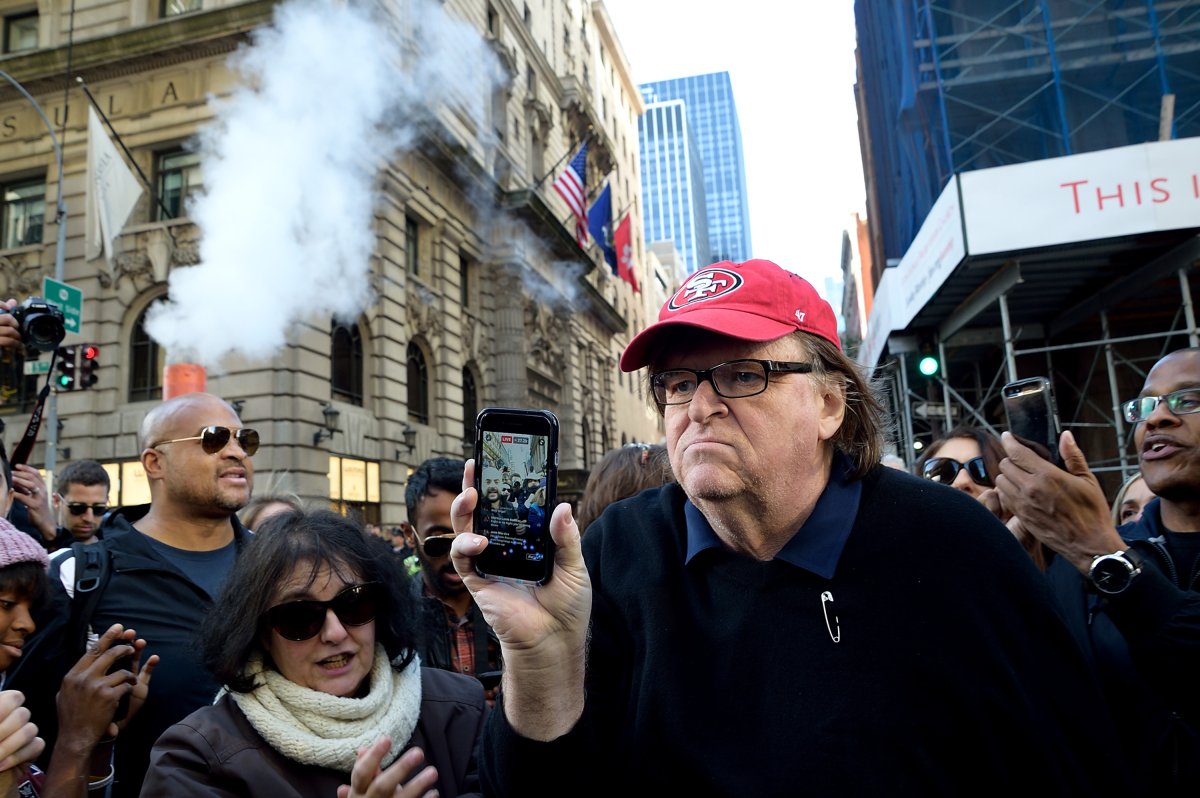
At 53rd St., a scrum of marchers and photographers coalesced around filmmaker Michael Moore, who earlier in the day had ridden up the gilded escalator of Trump Tower, hoping to catch a meeting with The Donald. He got shot down.
Trump was evidently too busy holding court in his penthouse with British Brexit campaigner Nigel Farage and Republican National Committee Chairperson Reince Priebus, who Trump has tapped as his chief of staff.
Moore stood at the head of the march filming the demonstrators swarming up Fifth Ave. with his cell phone.
“Look at this. It just keeps coming,” he marveled.
Many people said they’d never thought to protest a presidential election before.
“I accept the outcome of the election,” said Camille Manfredi, a tax analyst from Woodbury, N.J. “But I want to send a clear message to the three future branches of government. I want them to think twice before initiating a super-conservative agenda. I hope they know there will be repercussions.”
Katie Lapham of Brooklyn marched with a handlettered sign: “Teachers Against Trump.”
“For my mental health, it’s better to come here and protest than just isolate at home,” said the 43-year-old ESL teacher. “How do you even talk about this man as president in the classroom? I have Muslim students who say, ‘He thinks we’re all terrorists.’ ”
“It’s disgusting,” remarked Nadya, a 19-year-old Muslim woman from Brooklyn who was marching with her 10-year-old sister. “This is a man going on trial for [allegations of] pedophilia in two weeks, and he’s our president?”
The original call for Saturday’s march was posted on Facebook by Black Matters US, a small, Georgia-based nonprofit with activists affiliated here and in other cities. But none of the people interviewed by The Villager had even heard of the group; they said they’d found out about the demo online or from friends. (There were reportedly other calls for anti-Trump protests starting at 4 p.m. and 9 p.m.)
“I figured there had to be a protest today because it’s Saturday, so I just googled it,” said Yvette Daniel, a 40-something copyeditor, who took the train down from Mount Vernon, N.Y., to register her dissent.
“Obviously, I voted for Hillary,” said Daniel, who is black. “If it were any other candidate, I wouldn’t be here. But this guy is just too dangerous. He scares people. Is that what we want for a president?”
Many Clinton supporters said they felt traumatized by Trump’s win.
“I’m heartbroken,” said Mollie Bower, a nanny from Murray Hill who volunteered for Clinton. “It’s so awful that this sexist bully was chosen and a really qualified woman lost. It’s like waking up to a nightmare.”
Brian Massingale, a 59-year-old ethics professor at Fordham University, agreed.
“I think we’re in for a very terrible and dark time in this country,” said Massingale, who is both black and gay. “If congressional leaders didn’t stand up to him as a candidate, how are they going to stand up to him now that he’s in power?”
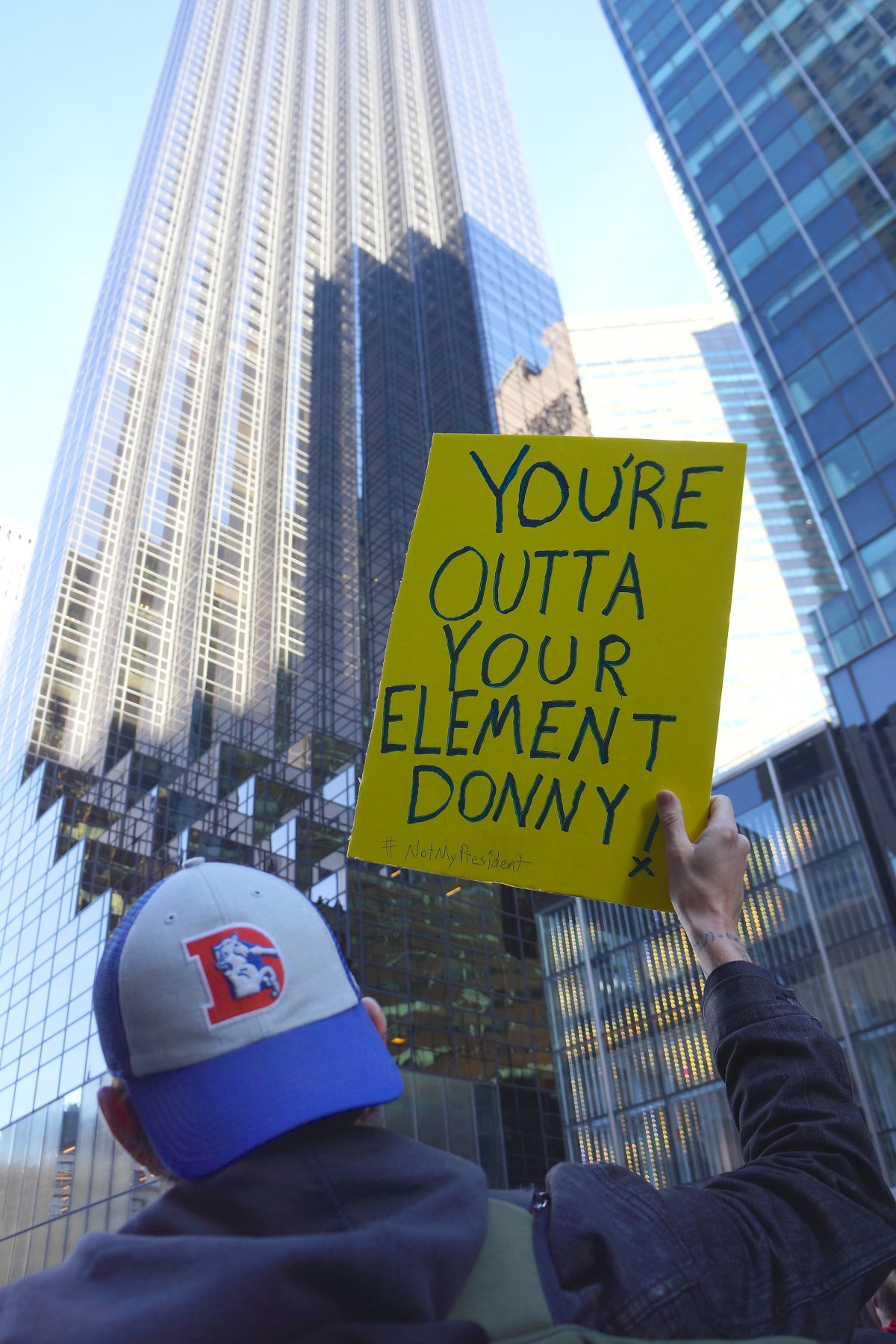
Like many, Massingale didn’t know what else people could do besides protest. Hopes that Trump could be impeached if he is convicted of fraud (in the Trump University case) or even treason (for allegedly colluding with Putin) seem dim, given the lock Republicans now have over both the Senate and the House. And even then, impeachment would only land us with the antigay and anti-abortion zealotry of Trump’s running mate, Mike Pence.
A petition calling on the electors in the Electoral College to reject Trump as unfit and cast their votes for Clinton, who won the popular vote, has thus far garnered more than 4 million signatures. But it’s doubtful that enough electors would bail on Trump to reverse the election’s outcome.
Nevertheless, activists across the spectrum are strategizing for ways to resist. There are calls for people to create civil-defense teams to support immigrants at risk of deportation, as well as gays, Muslims, blacks and others who are being targeted with hate crimes in the wake of the election. Environmentalists say they’ll double down with direct actions.
Others are planning to hone in on upcoming local and state elections in hopes of turning back the red tide.
“I have a feeling this is going to grow,” said writer Jamie Jackson, an Australian native who cast his first vote this year as an American citizen. “Trump doesn’t have the capacity to heal this divide in the country. His first instinct when he saw the protests against him was to go on Twitter and blame it on professional demonstrators. He’s all about division.”
“I think it’s really important for the world to see this,” added his wife, SoHee Youn, a composer from Seoul who also just became a citizen. “People are really scared in Korea right now. Our safety really relies a lot on American aid. Now many Koreans are not sure we’ll have his back.”
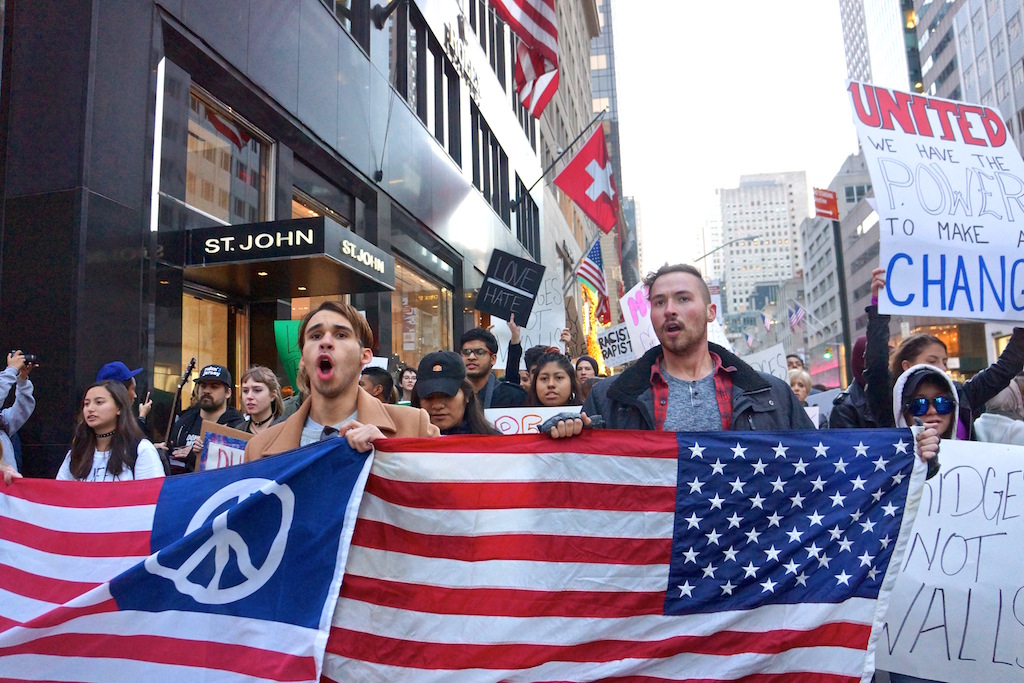
Further down on Fifth Ave., a clutch of pro-Trump counterdemonstrators was catching heat from the crowd.
“I love you,” mouthed Lynn Trevino of Baltimore, responding to all the epithets hurled her way as she proudly waved a “Make America Great Again” sign. “We’ve gotta stop arguing temporarily about social issues and stop our middle class from imploding,” she said, dismissing the protestors’ multi-hued signage. “If this country isn’t fixed financially in the next five years, our whole system could collapse.”
But most New Yorkers have no such faith in Trump’s business acumen.
“We can’t give him an inch,” declared Gregory Cornejo, a union organizer from the Bronx. “None of the progress we’ve had in the last eight years should be undone.”
“I can understand that many people in Middle America felt left out,” Cornejo added, speaking of the broad swath of the U.S. that evidently feels otherwise. “But they don’t know Trump as well as we know him here. He’s no hero in New York.”
Progressive groups are planning a mass gathering in Washington, D.C., to denounce Trump on inauguration day. And the day after, a “Million Woman March” will be massing on the Mall.






